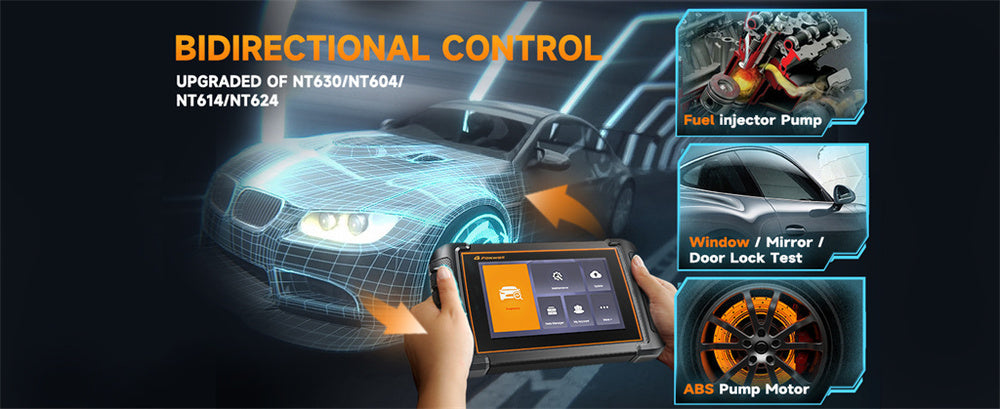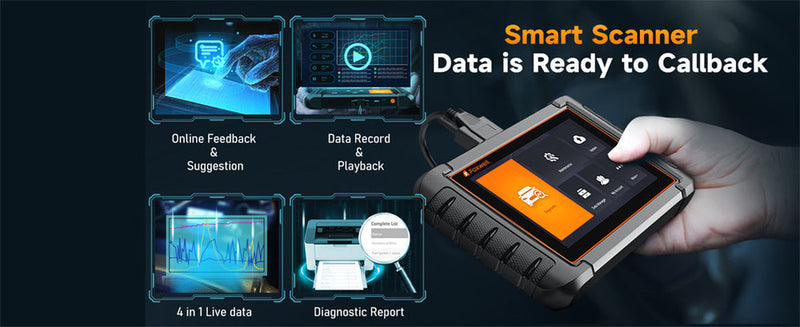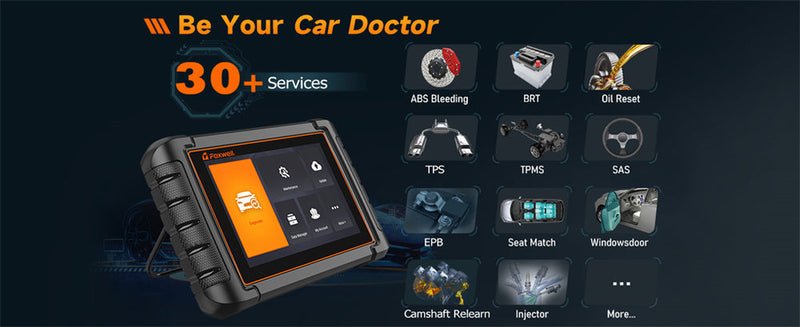Automotive maintenance and safety depend heavily on two essential technologies: OBD2 Diagnostics scanners and Tire Pressure Monitoring Systems.
Both are integral to maintaining vehicle safety while serving distinct roles; this introduction discusses their purposes and why TPMS should be considered essential to car safety.

Understanding Tire Pressure Monitoring Systems (TPMS)
Tire Pressure Monitoring Systems (TPMS) are automated systems designed to monitor air pressure inside pneumatic tires on various types of vehicles.
TPMS gives real-time tire pressure information to drivers via a gauge, pictogram display, or low-pressure warning light - providing real-time tire pressure data directly relevant to performance, fuel economy, and safety.
A reliable TPMS system is vital, as proper tire pressure can directly affect vehicle performance, efficiency, and safety.
Importance of Tire Pressure Monitoring Systems for Vehicle Safety
Optimizing tire pressure is more than just about prolonging tire life or improving fuel economy: it's a crucial safety measure. Under-inflated tires can lead to severe consequences, including:
Low Tire Pressure Can Reduce Steering Capability: Low tire pressure negatively impacts a vehicle's handling characteristics, making steering harder at higher speeds or during emergencies.
Increased Risk of Tire Failure: Under-inflated tires generate excess heat, leading to tire blowouts and serious accidents.
Longer Stopping Distances: Vehicles with incorrectly inflated tires have longer stopping distances, creating potential hazards during sudden traffic stops.
By continually monitoring tire pressure, TPMS helps mitigate risks by notifying drivers about any potential tire pressure issues before they worsen; in doing so, it plays an integral part in preventing accidents and increasing overall road safety.
Maintaining your vehicle requires an in-depth knowledge of all its tools, from OBD2 scanners to tires.
A common question among vehicle owners and technicians is whether any OBD2 scanner can reset Tire Pressure Monitoring Systems (TPMSs).
To address this question, assessing both standard OBD2 scanner capabilities and why specialist ones are often needed for TPMS reset is necessary. To do this, let's explore their general capabilities and why more specialized models may be required.
Standard OBD2 Scanner Capabilities in Regards to TPMS
OBD2 scanners are used primarily to read and clear codes related to an engine and emission systems of a vehicle, providing access to valuable data regarding engine health as well as statuses connected with it such as tire pressure monitoring (TPMS).
They also offer access to useful diagnostic data regarding connected systems, which could provide insight into health issues for individual components like brake pads.
Engine Diagnostics: Standard OBD2 scanners can quickly identify issues within an engine block, such as issues related to combustion processes, emissions, or sensor malfunction.
Code Reading and Resetting: These devices can read and reset generic diagnostic trouble codes (DTCs) consistently across vehicles.
However, TPMS issues typically generate manufacturer-specific codes that are inaccessible through basic OBD2 scanners.
OBD2 scanners often offer features that extend beyond basic engine diagnostics, including reading body control and chassis control functions.
Still, TPMS capabilities usually need to be revised, creating significant limitations with standard scanners regarding this issue.
Specialized Scanners May Be Necessary for TPMS Reset
Programming and resetting of tire pressure monitoring systems (TPMSs) require special features that cannot always be supported by generic OBD2 scanners, thus necessitating an additional solution: specialized scanners are often necessary when it comes to TPMS reset and programming functions. Here's why special-purpose scanners may be required:
Manufacturer-Specific Protocols: Tire Pressure Monitoring Systems (TPMS) modules typically operate according to specific protocols that vary depending on each vehicle manufacturer.
Specialized scanners are equipped to recognize these unique protocols and interact directly with TPMS modules.
Advanced Functionality: Resetting TPMS may require clearing codes and reconfiguring or relearning sensors or IDs to ensure that your vehicle's central system recognizes them after replacement or tire rotation.
Integrated Features: Specific TPMS scanners include integrated features that assist in comprehensive maintenance, such as sensor programming health check capabilities and real-time display of sensor data. Such functionality cannot be found with standard OBD2 scanners.
Related Reading: Top 3 Best TPMS Tools to Buy in 2025
Features of TPMS-Specific Scanners
The appropriate diagnostic tool is critical for tire pressure monitoring systems (TPMS). Not all OBD2 scanners provide enough capabilities for reprogramming or resetting, so a TPMS scanner is an indispensable choice for those requiring comprehensive and functional interactions with this system.
We will examine both OBD2 scanners and specific tools explicitly designed to interact with TPMS systems, then highlight vital features to look out for in a scanner capable of effectively resetting or reprogramming; finally, we will focus on models available from Foxwell as an option.
Scanners are designed primarily to read and clear codes related to engine and emission systems.
Limited Tire Pressure Monitoring Systems Capabilities: General scanners can only read tire pressure monitoring system codes found within OBD2 diagnostic trouble codes; they cannot reset or reprogram them.
TPMS-Specific Tools
Enhance TPMS Functionality: These scanners are specifically designed to interface with the vehicle's TPMS, providing features like resetting, programming, and even replacing its sensors.
Direct Communication: TPMS scanners connect directly with a vehicle's TPMS module, offering detailed diagnostics and sensor data.
Key Features to Look For in a TPMS-Specific Scanner
Its When choosing a TPMS-specific scanner, several features stand out as particularly essential:
Sensor Compatibility: Ensure the scanner supports a range of TPMS sensors, as compatibility can vary significantly across vehicle makes and models.
Sensor Programming: Successfully programming new sensors is of the utmost importance when replacing old sensors or switching between summer and winter tires.
Resetting and Relearn Procedures of TPMS Sensors: Look for scanners with straightforward reset options that guide users through relearn procedures after replacing or resetting sensors.
Live Data Monitoring: For accurate diagnostics, advanced scanners provide real-time data from each sensor - such as pressure, temperature, battery status, and more - which allows for real-time tracking of each variable. This data allows for precise monitoring.
Foxwell Models to Support Reset for Tire Pressure Monitoring Systems
Foxwell provides several diagnostic tools with outstanding TPMS management and resets capabilities, including their NT310 and NT530 models.
These devices were created specifically to meet the demands of professionals and car enthusiasts looking for accurate and dependable TPMS functionality.
Foxwell NT310 TPMS Universal Tool: The Foxwell NT310 is designed for specific TPMS tasks, with features to trigger, program, and relearn sensors and perform diagnostic functions.
User-Friendly Interface: With user-friendliness in mind, the NT310 offers a straightforward interface designed to simplify TPMS maintenance tasks - suitable for novices and professionals alike.
Foxwell NT530 Multi-System Scanner Washes Down With Versatility
The Foxwell NT530 offers versatile diagnostic capabilities beyond TPMS, providing complete system diagnosis of engines, ABS brakes, airbags, and more. Plus, it has additional features to diagnose and reset TPMS quickly and easily!
Vehicle-Specific Software: What sets the NT530 apart is its vehicle-specific software, enabling it to act as an OEM diagnostic tool across various brands, ensuring accurate TPMS resets and diagnostics.
Advanced Features: This model also supports advanced functions, including bi-directional tests that can direct vehicle components to perform specific functions - an invaluable feature for troubleshooting and validating repair solutions.
Additional Features of Foxwell NT310 and NT530:
Both models share some key attributes that make them ideal for TPMS work: Direct TPMS Support: They allow direct access to the sensors and modules inside a vehicle to monitor and reset its TPMS system effectively.
Comprehensive Coverage: These scanners support an expansive selection of vehicle makes and models equipped with tire pressure monitoring systems (TPMS), making them the go-to choice in different automotive settings.
Foxwell offers regular software updates for these models to ensure they remain compatible with the most up-to-date vehicle models and TPMS technologies.
Foxwell's NT310 and NT530 models are indispensable tools in automotive diagnostics, particularly Tire Pressure Monitoring Systems.

conclusion
Each scanner was specifically created to meet different needs: the NT310 is ideal for focused TPMS tasks with user-friendly functionalities, while the NT530 covers comprehensive vehicle system diagnostics, including TPMS capabilities.
These models provide reliable TPMS maintenance solutions for amateurs and professional mechanics, making TPMS maintenance accessible and practical.
Equipped with direct TPMS support, vehicle-specific software support, and the capability to perform various automotive diagnostic tasks, the NT310 and NT530 ensure vehicle safety and efficiency.
Foxwell's commitment to innovation and quality can be seen in these models, which adapt to the ever-evolving demands of automotive technology.
From simple maintenance jobs to complex repairs, Foxwell tools offer the reliability and precision necessary to keep modern vehicles performing at their best.
FAQs
Can the Foxwell NT530 perform TPMS Resets?
Yes, the Foxwell NT530 can provide TPMS resets as part of its extensive diagnostic functions for vehicle system analysis. It makes an ideal tool for comprehensive vehicle system diagnostics.
Is the Foxwell NT310 Suitable for professional use?
Its primary functionality lies in TPMS diagnostics, such as trigger, program, and sensor relearn. That makes the Foxwell NT310 an invaluable addition for automotive repair shops and service departments.
Do Foxwell scanners come equipped with updates for new vehicle models?
Foxwell regularly releases software updates for their scanners NT310 and NT530 to keep them compatible with new vehicle models and automotive technologies.





Leave a comment
This site is protected by hCaptcha and the hCaptcha Privacy Policy and Terms of Service apply.